- Home
- Brian Garfield
Marshal Jeremy Six #4 the Proud Riders
Marshal Jeremy Six #4 the Proud Riders Read online
The Home of Great Western Fiction!
If it hadn’t been for John Paradise arriving in town the same time as a government payroll amounting to sixty-five thousand dollars in gold, Marshal Jeremy Six might have passed a peaceful Fourth of July weekend.
But the one-armed killer with a reputation of having gunned down fifty-seven men in his time was perched, sphinx-like, on a barstool, “waiting for a friend.”
And Harry Rose, a fat dude from the East, arrived with his entourage in Spanish Flat, gravitated toward the Drover’s Rest Saloon “to wait for his partner.”
The talent accumulating in town made the marshal itch. Then as four men were shot dead and the payroll disappeared, Jeremy knew he was refereeing a free-for-all between two bands of professional bandits.
MARSHAL JEREMY SIX 4: THE PROUD RIDERS
By Brian Garfield writing as Brian Wynne
First Published by Ace Books in 1967
Copyright © 1967, 2019 by Brian Garfield
First Digital Edition: June 2019
Names, characters and incidents in this book are fictional, and any resemblance to actual events, locales, organizations, or persons living or dead is purely coincidental. All rights reserved. No part of this book may be reproduced or transmitted in any form or by any means, electronic or mechanical, including photocopying, recording or by any information or storage and retrieval system, without the written permission of the author, except where permitted by law.
This is a Piccadilly Publishing Book
Series Editor: Ben Bridges
Cover Art by Gordon Crabb
Text © Piccadilly Publishing
Published by Arrangement with the Author’s Agent.
Chapter One
The road twisted and tilted through heavy pine forest. Its deep-worn ruts were half overgrown with brush and mountain grass, for few wagons had traveled it recently. Not very far above, caps of snow peaked the Sangres above timberline. The sun glittered down through rarefied air, poking among the trees here and there: it picked out a rider, moving quickly in and out of sunlit patches. Patterns of shadow crisscrossed the road; every depression in the ground was full of puddled water, left behind by last night’s heavy thunderstorm.
The long-jawed horseman paused in a circle of sunlight to breathe his horse. He cuffed his hat back and frowned forward into the timber. A brown bear rolled into the road fifty yards ahead, turned around and looked at him. Its head was down near the ground, as if it wanted to root in the road with its nose. Without hurry, the bear turned and waddled out of sight into the trees.
Lines of anger and anxiety creased the tall horseman’s face. He gigged his horse forward smartly.
The afternoon hung cool and silent, broken only by the soft jingle of bit-chains and spurs, the hoofbeats of the horse and the easy creak of saddle leather. The road carried the traveler around a sharp bend and dipped across a creek where brush made a thick undergrowth, half-drowned in spray from the creek: it flowed down a steep pitch, crashed over rocks, and frothed its way across the road. On the far side of the ford a deep-rutted trail led up the slope and disappeared into the trees.
The horseman stopped and gave that narrow path a long moment’s careful scrutiny. But presently he spurred his horse on down the main road, lifting it to a quick cantering pace. The trace went downhill rapidly, bordered by forests that seemed to stretch away indefinitely to either side, rolling over the mountaintops. In the depths of the timber a dark silence seemed to brood. The footfalls of his horse were muffled by a thick fallen carpet of half-rotted pine needles, tossed down by branches that overhung the road, and matted into a spongy morass by yesterday’s rain.
The horseman stopped long enough to dismount and inspect the earth with close care. Then, with a strict expression on his face, he mounted up again and guided his horse down the arched-over corridor at a mile-eating clip.
These great monolithic mountains, the Sangre de Dios—“Blood of God”—ranged away across limitless miles. Somewhere in here, the border ran through, marked only by occasional rock cairns to distinguish the soil of Mexico from the soil of Arizona Territory. Dwarfed by the ten-thousand-foot peaks, a man was diminished to nothing. The horseman looked sternly on the tall lances of pines that surrounded him; and then, without warning, the road swerved around a sharp curve and spilled abruptly onto a broad flat of earth.
Here in this shallow dish of ground stood what had once been Jefferson Camp. Now it was a few dozen tumbledown relics in varied states of abandonment and collapse. The deserted tailings of gold-mining ventures made great heaps all around the flat; weeds had already found plentiful root in them. A stream bubbled out of a powerful spring by the road and flashed glittering across the valley to drop away into a canyon at the far end. Little gnarled live-oak trees sprouted here and there; some of the ghost-shacks were shaded by pines and aspens.
Peaks loomed on all sides giving the ghost town a bottom-of-the-world setting, although in fact its altitude above sea level was at least six thousand feet. The horseman put his mount down the center street and cruised into town at a slow walk, bobbing his attention from cabin to cabin as if peopling them from memory. But his attention lay more often on the ground than on the buildings. The sagging structures gaped silently through empty doorways and paneless windows and the yawns of fallen-in walls; they could tell a man nothing; but the ground could tell many a story to a man with keen eyesight.
The tar-and-wood shacks stood weathered into a brittle gray hue and the street, running between them, was packed and washed and broken by weather. The horseman’s narrowed inspection covered every square foot of ground, but from the growth of his frown it was evident that he was not finding whatever it was he sought.
Someone appeared in a doorway up ahead.
The horseman’s horn-knuckled hand slipped to the gun butt at his hip.
The man in the doorway was age-hunched and bearded, peering forward with his head out-thrust on a ropy neck; he passed a hand across his face as if to clear his vision. His face lifted slowly as the horseman advanced; the old man waited without moving until the rider came to a stop, whereupon the old man smiled tentatively, and the horseman said, “Hello, Sorrowful.”
The old man had to clear phlegm from his throat before he could speak. “Jeremy Six, ain’t it?” His voice cracked like a chicken’s, and he pronounced the name “Say-ix,” in accents that harkened all the way back to the Ozarks.
The horseman nodded. “You’ve got a good memory.”
“Never forget a face,” said Sorrowful, “nor a name. Ain’t much round here no more but memories to feed on.”
Jeremy Six had another look around the town and a small light in his eyes seemed to extinguish itself. He was a weather-beaten man; he looked a little ragged around the edges, like a man who had ridden too far too fast without enough sleep. He was lean and broad in the shoulders but his craggy face was worn and weary. His hands were rope-scarred; his long legs were encased in dark stovepipe trousers. Sorrowful said, “You still peace officering?”
“Yeah.”
“Kind of out of your bailiwick down here, ain’t it?” The old man licked his dry-cracked lips.
“Sorrowful,” said Jeremy Six, “if you had eighty prime steers and you wanted to drive them from Council Springs across the border, which pass would you take?”
“How’s that?”
“I lost their tracks at Council Springs in the rain last night.”
The old man stepped out of the doorway, his joints moving with the rheumy stiffness of age. His voice took on a wistful softness. “Well, I might could think better on the price of breakfast tonic, Jeremy. I’m about as broke as the
Ten Commandments, to tell you the truth.” The watery old eyes clutched anxiously at Six; the head bobbed up and down.
Six answered by dropping a coin in the old man’s ready palm. Sorrowful’s words rushed forth in a torrent: “You a friend, Jeremy Six, I always say that. You want to find a man you can trust, look up old Jeremy Six, you can depend on him, yes sir, I want to tell you—”
Six cut him off: “I’m looking for eighty head of rustled cattle, Sorrowful. Eighty steers don’t just fly off the face of the planet.”
“Rustled?”
“Yeah.”
Sorrowful said, “Recognize any of ’em?”
“Cows all look the same to me,” Six said, deadpan. “Look, Sorrowful, you know this part of the country a lot better than I do.”
“That was a pretty hard rain last night. Don’t wonder you lost the tracks. They’s four, maybe five canyons they could’ve clumb into, out of Council Springs. Any one of ’em would get you across the border. If they was in a real big rush to get there, they’d likely’ve come right through here. This is the fastest route. But they ain’t been this way, I can vouch for that. Makes me kinda suspect your rustler friends don’t want to run the tallow off them eighty steers. Prime, you said.”
“Good beef,” Six agreed. “Rustled off Tracy Chavis’ Chainlink Ranch.”
“Well, that bein’ the case, I’d ’spect they’d want to take them cows over the easiest pass they could find. Keep the fat on ’em so they’d get top dollar when they go to sell them south of the border. You know, them Mexican cattle buyers is pretty shrewd about—”
“Sorrowful,” Jeremy Six said gently, “I’ve got to catch up to them before they cross the border.”
“Well, then, sure you do. I mean, wouldn’t be much use if you caught ’em on the other side, would it, now?”
“Which pass, Sorrowful?”
“Why didn’t you say so?” His bony shoulders twisted around. He raked gnarled fingers through his stringy beard and lifted his arm slowly to point southeast.
“That one. Parker Pass. Green grass all the way and an easy grade. And besides, if you lost their tracks at Council Springs, then that’s the way they had to go. Right up that rock shelf from Council Springs. Wouldn’t have left tracks on that rock. I remember you, Jeremy Six—you’re a man could track a fly across a wall. If you couldn’t follow ’em it means they wasn’t no tracks to follow. Even in the rain they’d have busted some twigs and such if they’d gone any other way but up them rocks.”
Jeremy Six nodded gravely. “Sometimes a man gets tired,” he said vaguely. “I should’ve seen all that for myself.”
“How long you been on their trail?”
“Five days.”
“Had any sleep in that time?”
Six shook his head. “They had a twenty-four hour start on me. I had to catch up.”
“How many of ’em?”
“Three men, from the tracks.”
Sorrowful’s old face squinted up shrewdly. “Ike Lockhart and his two sons, maybe?”
“Maybe. Thanks for the help, Sorrowful.” Without further talk, Jeremy Six lifted his reins and galloped out of Jefferson Camp.
The old man’s eyes followed him; the old man’s head turned to follow him up the mountain. The old man’s face was somber. Them Lockhart boys are tough as brambles. He ain’t going to outfight the three of them, not with five days of no sleep behind him.
To Jeremy Six there was no question of stopping to sleep. Caught in the iron embrace of his sense of duty, the marshal of Spanish Flat did not accept any choice other than the duty to give everything he had, for the sake of the law. If that meant going without sleep, or without food, or even without water, then he would go without—until it killed him. More than that, even the law could not demand of him.
Fatigue drove agony through him with every plunge of the horse’s hoofs. He felt dizzy-drunk and saddle-sore; he watched the world through a haze-film that made everything seem slightly unreal.
The sun slipped across its westering arc while Jeremy Six urged his tired horse up Parker Pass. Not too far above Jefferson Camp, he found what Sorrowful had expected he ought to find; a scatter of yellow slivers in the grass, where the passage of hoofs during the day had broken twigs open. Then, at half-past three, the tracks themselves began to show up: the stolen cattle had been here when the rain had stopped. After the storm, the sky had cleared quickly: there was no more rain to wash out the tracks, and up here, at eight-thousand feet with the thin air making him even dizzier, Jeremy Six broke out of the scrub timber and found himself above the timberline with nothing in front of him but rocks and mud.
Eighty steers had a way of messing up a mountain of mud pretty badly. A one-eyed imbecile could have followed the train of the Chainlink cattle across the summit of Parker Pass and down the gentle slope of the southern trace.
Jeremy Six’s raw bleak face settled into stoic lines. He had lost too much time; the rustlers had been blessed by blind luck—the storm had slowed down pursuit. Now, Jeremy Six knew, it was too late. Short of a miracle, there was no way he could catch up before the herd crossed into Mexico.
Jeremy Six was the town marshal of Spanish Flat—technically, the Chief of Police—and his jurisdiction properly ended at the town limits. But in Arizona in the Eighties there were twelve county sheriffs to serve the law-enforcement needs of a population that was scattered across a land some four hundred miles long and three hundred wide: an area in which each county was larger in size than most Eastern states. To supplement the service of the county sheriffs, the Territory had seen fit to issue Deputy United States Marshal’s badges to certain selected town marshals in out-of-the-way towns where county law did not reach. The issuance of these badges was made possible by a technicality: it was possible for any citizen to obtain a Deputy United States Marshal’s badge if the citizen could prove that his duties included the collection of taxes. And since most towns had no professional tax collector, the duties of that office fell to the town marshal.
The fact was, then, that Jeremy Six was a Deputy United States Marshal (for the purpose of collecting taxes, his commission stated); and therefore his jurisdiction extended to any point within the territorial limits of the United States of America.
It was seldom pointed out that the jurisdiction of a federal marshal covered only federal crimes; in any event, the attempt to take stolen cattle across an international boundary was certainly federal enough.
At best, a town marshal was on shaky ground when he tried to enforce his U. S. Marshal’s commission outside his own town limit. He was on no ground at all, if he tried to enforce it outside the United States.
And, Jeremy Six kept reminding himself, Mexico was outside the United States. His power ended at the border, period.
And so, if he did not catch the rustlers before they crossed the border, he would not catch them at all. It was that simple. And, every moment now, it became clearer and more unquestionable that he wasn’t going to beat them to the border.
He was right.
He came down around a bend in the canyon, and his tired eyes lay hard and bright against the crude pyramid shaped rock pile that stood beside the road. The stolen cattle had broken up the ground on their way through leaving behind a road that was fast drying into a minor badland of churned clay. They were long gone, the cattle; but one steer, its leg broken, lay dead with a bullet-hole in its head just a few feet from the rock marker.
“Makes a fittin’ gravestone, don’t it?”
The man who spoke was slab-sided and redheaded, with a wild thatch of hair that poked straight up from his hatless head. He sat on a horse that was as rawboned as he was; his hands, long-fingered and freckled, lay on top of one another on the saddle-horn—as clear an indication as a man could give that he meant no trouble.
He sat just beyond the rock cairn, and grinned. “The boys sent me back to see who was on our back trail. Took you long enough. I been here almost an hour.”
Jeremy Si
x cuffed his hat back, halted his horse twenty feet short of the rock cairn, and let his weary red-raw eyes play over the scarecrow shape of the redheaded horseman.
“Case you don’t recognize it, Marshal, that there tombstone’s one of the survey markers Mr. Gadsden’s boys left behind, back in ’58. That’s the borderline. I’m sittin’ my horse here in Mexico, Marshal.”
“I can see that all by myself, Lockhart.”
“Uh-huh,” said the redhead. “Well, I just wanted to make sure. Now and then a lawman kind of seems to blink his eyes when he rides past one of them markers. I just wanted to be certain you didn’t miss seeing it.”
Jeremy Six said, “Which Lockhart are you?”
“Huh?”
“I know your old man by sight, but I don’t know you that well. Which one are you?”
“Seth. My brother’s Malachi. He’s skinnier than me, that’s how you tell us apart. How come you want to know?”
“I like to know a man’s name before I hang him,” Jeremy Six murmured.
Alarm crept into Seth Lockhart’s eyes, but it was too late for him then. While he had occupied the redhead’s occupation with talk, Jeremy Six had managed to shift his hand closer to his gun; and now, sweeping the revolver forward in a blur of motion, he aimed low past Lockhart’s horse against the rocks beyond, and fired off an angry burst of bullets.
A horse, like a man, could be trained out of its gun shyness; but a horse, like a man, could be taken unawares. Unprepared for noise or violence, Seth Lockhart’s horse did just what Jeremy Six wanted it to do. It leaped, startled, away from the chipping, splintering screams of the bullets that Six was firing into the rocks. Slivers of pulverized rock-dust smashed back against the horse’s legs and drove it forward, frightened.
Startled by the suddenness of it, Seth Lockhart hardly had time to lift his reins. The rearing horse carried him forward, past the rock cairn, and before Lockhart could rein the animal back, Jeremy Six had plunged forward on his horse, ramming right past Lockhart, wheeling his taut-trained pony brutally aside into a hard-grunting collision with the other horseman. Six still had his gun in hand. He saw Lockhart’s hand fisting around the holstered gun butt; he swept his own gun down, raking the front sight across Lockhart’s forearm. The horses were tangled together for that brief instant. Lockhart cried out, releasing his gun; a red stream of blood burst from his cut arm. Six lifted his right boot free of the stirrup, lodged the heel against Lockhart’s shoulder, and pushed the man out of the saddle.

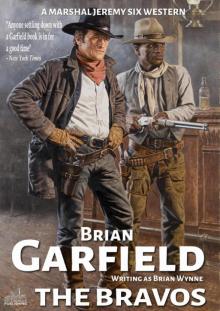 Marshal Jeremy Six #3
Marshal Jeremy Six #3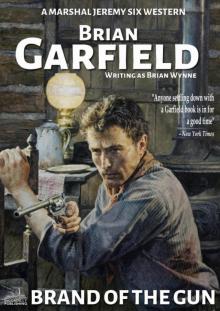 Marshal Jeremy Six #6
Marshal Jeremy Six #6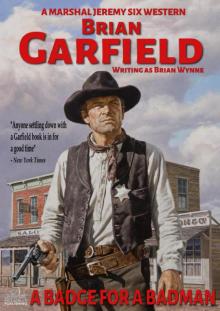 Marshal Jeremy Six #5
Marshal Jeremy Six #5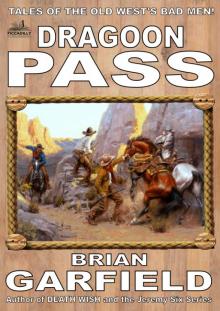 The Outlaws 2
The Outlaws 2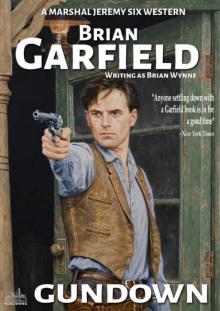 Marshal Jeremy Six #7
Marshal Jeremy Six #7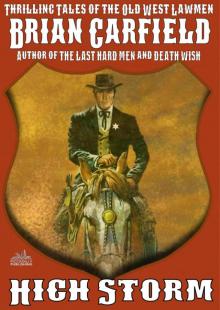 The Lawbringers 4
The Lawbringers 4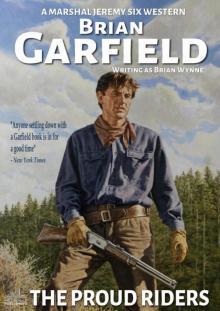 Marshal Jeremy Six #4 the Proud Riders
Marshal Jeremy Six #4 the Proud Riders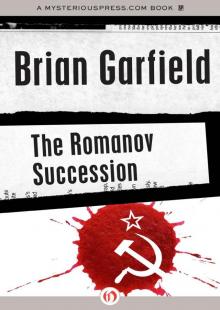 The Romanov succession
The Romanov succession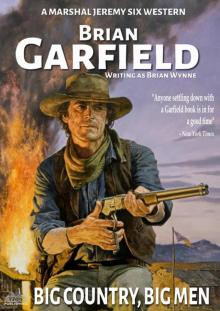 Marshal Jeremy Six #8
Marshal Jeremy Six #8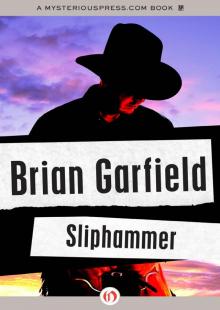 Sliphammer
Sliphammer Line of Succession
Line of Succession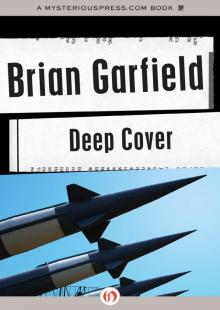 Deep Cover
Deep Cover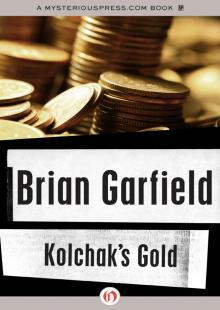 Kolchak's Gold
Kolchak's Gold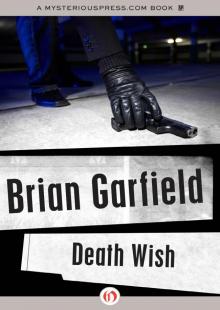 Death Wish
Death Wish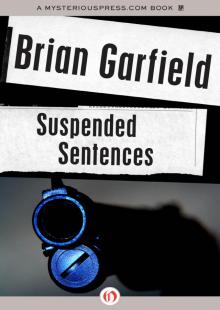 Suspended Sentences
Suspended Sentences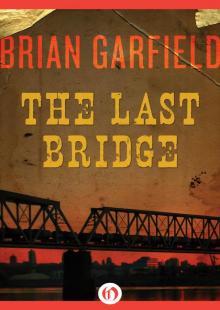 The Last Bridge
The Last Bridge Relentless
Relentless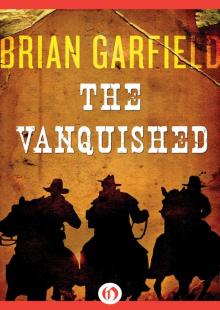 The Vanquished
The Vanquished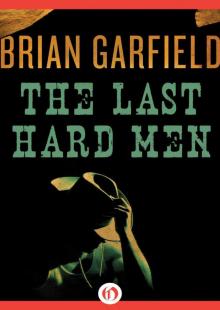 The Last Hard Men
The Last Hard Men Hit and The Marksman
Hit and The Marksman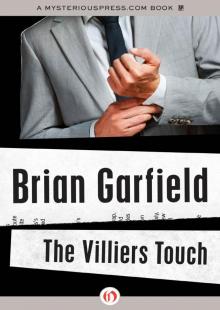 Villiers Touch
Villiers Touch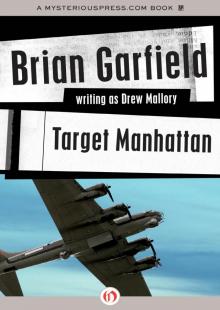 Target Manhattan
Target Manhattan Marchand Woman
Marchand Woman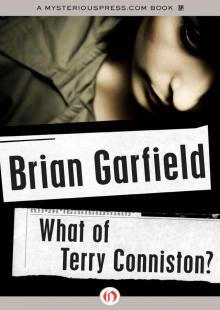 What of Terry Conniston?
What of Terry Conniston?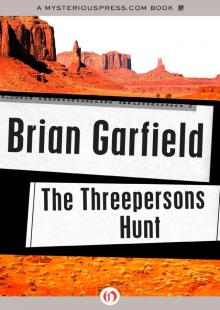 Threepersons Hunt
Threepersons Hunt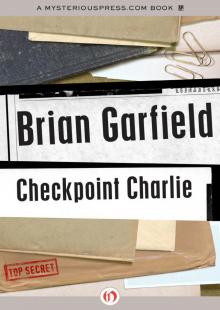 Checkpoint Charlie
Checkpoint Charlie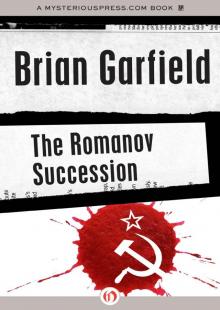 Romanov Succession
Romanov Succession Necessity
Necessity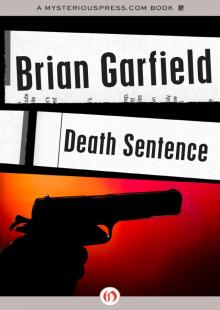 Death Sentence
Death Sentence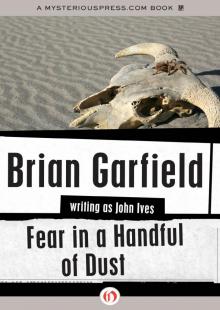 Fear in a Handful of Dust
Fear in a Handful of Dust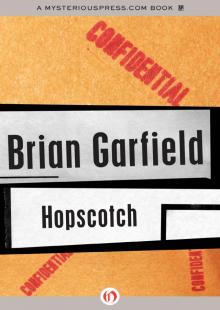 Hopscotch
Hopscotch